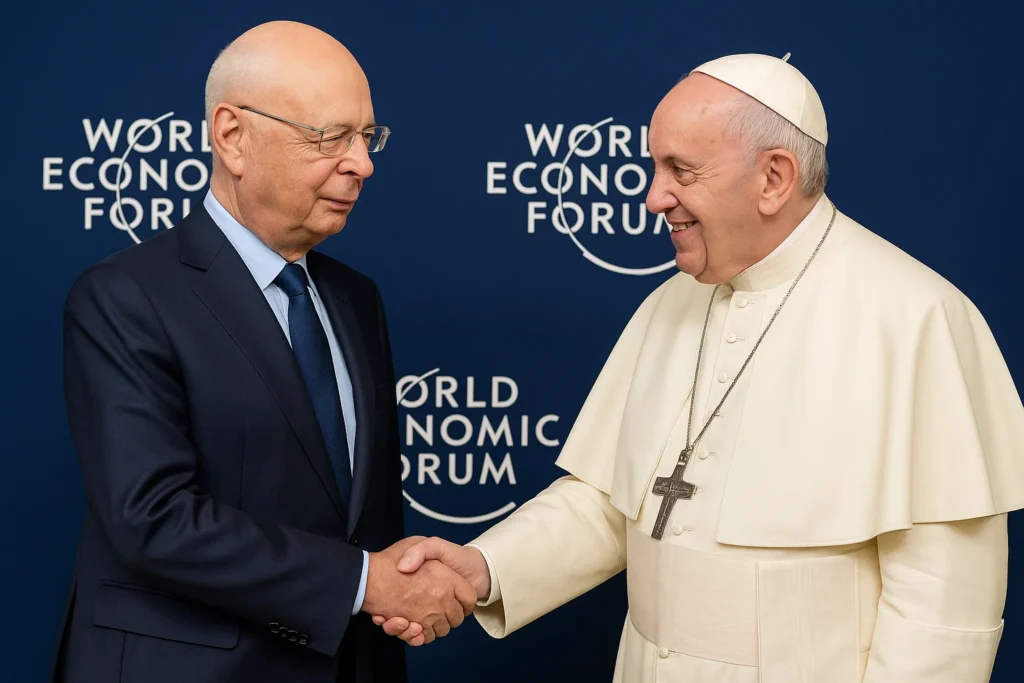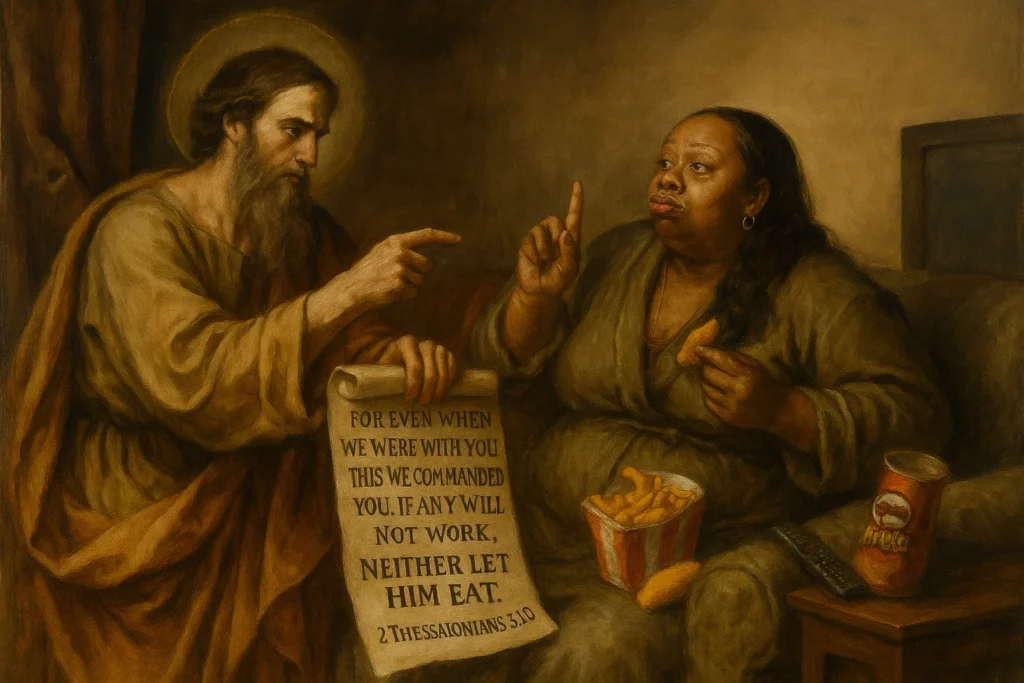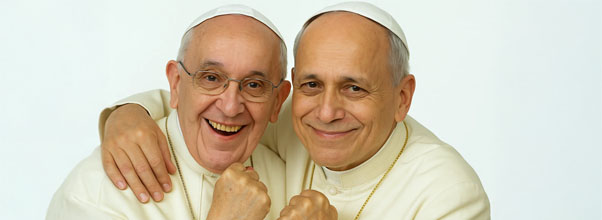Pope Leo XIV’s new apostolic exhortation Dilexi Te is being hailed by modernist Catholics as a prophetic call to social justice. But beneath this surface lies a more calculated aim: it is a masterful piece of internal rhetoric, a shot across the bow aimed directly at the traditionalist wing of the Church. Positioning itself as the continuation of his predecessor’s work, the document leans heavily on the authority of the Church Fathers, particularly the 4th-century Doctor of the Church, St. John Chrysostom—a figure traditionalists revere for his orthodoxy and liturgical theology. This is no accident. By seizing their saint, Leo attempts to execute a flanking maneuver, forcing traditionalists into a rhetorical box: either accept his political conclusions or reject the very patristic authority they claim to uphold.
Upon a close reading, however, a startling contradiction emerges: the Pope’s selective invocation of Chrysostom doesn’t strengthen his case—it completely undermines it, exposing a deep intellectual dishonesty at the heart of the Vatican’s new social vision.
A Church for the Poor?
The document’s third chapter, “A Church for the Poor,” is built upon a foundation of intellectual insecurity. Its argument relies not on robust, synthetic theology, but on a well-worn tactic of ideological documents: the weaponization of authoritative quotes to leapfrog over logical and historical context. This is not deep erudition; it is intellectual parkour. The authors use St. John Chrysostom as a rhetorical springboard, attempting to bypass serious theological scrutiny by the sheer force of his name.
In Paragraphs 41 and 42, Leo XIV makes his boldest gambit, deploying the “Golden-Mouthed” saint’s most radical economic claims:
“Do you wish to honor the body of Christ? Do not allow it to be despised in its members, that is, in the poor, who have no clothes to cover themselves. Do not honor Christ’s body here in church with silk fabrics, while outside you neglect it when it suffers from cold and nakedness… What advantage does Christ gain if the sacrificial table is laden with golden vessels, while he himself dies of hunger in the person of the poor? Feed the hungry first, and only afterward adorn the altar with what remains.”
But wait, there’s more:
“Not giving to the poor is stealing from them, defrauding them of their lives, because what we have belongs to them.”
The messaging is clear and potent: the Church’s ancient, uncompromising tradition demands a radical redistribution of wealth. But here lies the fatal flaw. Pope Leo has implicitly endorsed the Chrysostomic worldview in its totality. Once the papal argument grants patristic literalism as a moral yardstick, it must live or die by consistency.
This is where the Vatican’s carefully constructed narrative collapses. The attempt to weaponize Chrysostom against the trad laity—who are often profoundly generous in their private almsgiving—fails because it misidentifies the target. The saint’s most fiery condemnations were reserved for the clerical elite of his day, not the pious faithful. Consider what a full-throated adoption of Chrysostom would actually require:
- The Liquidation of the Vatican Itself. Chrysostom’s condemnation is directed at the religious elite who lavishly adorn churches while the poor starve. The logical, inescapable conclusion is to immediately liquidate the Vatican’s unimaginable wealth—its museums, its vast real estate, its gold—and distribute it to the world’s destitute. To do anything less is, by the standard Leo himself has set, a damnable offense.
- A Purge of Moral Laxity and Corruption. Chrysostom was merciless in his criticism of lax and corrupt clergy. Will Pope Leo now apply this standard to cleanse the Church of its careerist bishops and the homosexual networks that have caused endless scandal? Chrysostom’s model is one of purgation, not dialogue.
- A Reckoning with “Problematic” Theology. Most damningly, will Pope Leo now preach from Chrysostom’s Eight Homilies Against the Jews? These sermons contain some of the most vehement anti-Judaic polemics in all of patristic literature. Yes, Chrysostom’s language reflects his time, but that is precisely the point—a literalist invocation of patristic authority invites the full moral and historical burden of that era. The Vatican’s entire ecumenical project with modern Judaism would be incinerated by Chrysostom’s uncompromising rhetoric.
Yet, even as Leo wields Chrysostom as a cudgel, he simultaneously subverts his own authority by anchoring the document not in the broad stream of tradition, but in the narrow channel of his predecessor’s priorities.
The Ghost in the Machine: Francis’s Posthumous Triumph
Beyond its patristic cherry-picking, Dilexi Te reveals its true nature as an ideological project through a staggering, tell-tale statistic: the repeated (40 times) invocation of Pope Francis himself. He is quoted or referenced forty times, his encyclicals serving as the document’s foundational pillars. This is not merely respectful continuity; it is an act of intellectual cannibalization. Pope Leo XIV has hollowed out his own authority, reducing his first major exhortation to a glorified commentary on his predecessor’s work. The Church’s timeless tradition has been artificially funneled through the narrow conduit of a single, contemporary papacy. The message is clear: the only permissible interpretation of “love for the poor” is the Francis interpretation.
The Roman Rumor Mill: A “Theological Drone Strike”
Whispers from well-placed traditionalist circles inside the Vatican walls paint a far more calculated picture than one of mere intellectual homage. The consensus is that Dilexi Te was rushed to publication by the Curia’s remaining Francis-era holdouts, a powerful bureaucratic bloc that survived the transition. Their primary objective was not pastoral care but pre-emption. This document is a strategic weapon designed to marginalize and silence the growing, confident resistance emanating from theologically orthodox dioceses in Africa and Eastern Europe—regions that represent the Church’s demographic future and greatest numerical strength.
In the closed-door meetings of the Roman clergy, the document has earned a sinister nickname: “the theological drone strike.” Its purpose is to decapitate the traditionalist movement by seizing its theological language and using it against them. The forty citations of Francis are thus understood not as reverence, but as a non possumus—a required loyalty oath for any bishop or bureaucrat who wishes to remain in good standing with the new, yet unchanged, regime.
The St. Gallen Endgame: Cementing a Legacy
This gambit appears to have deeper roots than mere bureaucratic inertia. Scuttlebutt from European seminaries with close ties to the Curia suggests the heavy, non-negotiable reliance on Francis was a specific demand from the so-called “St. Gallen Mafia” holdovers who helped orchestrate his election. Their endgame is now clear: they see Leo XIV not as his own man, but as their vehicle for canonizing Francis’s controversial program in perpetuum, embedding it into the magisterial foundation before the broader Church can properly digest, critique, or reject it. This is a brazen attempt to bypass the slow, organic development of doctrine and achieve permanent institutional capture by theological fiat. It is a risky, all-or-nothing gambit to lock the Church into a single, globalist-inclined interpretation for generations, making any future correction nearly impossible.
The Strategic Conflation: From the Poor to the Migrant
A careful reading reveals a subtle but profound bait-and-switch. The exhortation begins with a universal call to care for “the poor”—the hungry, the naked, the imprisoned. However, the document swiftly and deliberately repurposes this ancient obligation. By Paragraphs 73-75, “the poor” has been functionally redefined. The focus shifts almost exclusively to migrants and refugees. The biblical imperative to care for the impoverished within our own communities is strategically expanded to morally necessitate specific, contested immigration policies—namely, open borders and the dissolution of national sovereignty.

This is not organic theological development; it is a political maneuver. It takes the Church’s undeniable duty to the poor and uses it as a moral cudgel to force acceptance of a globalist immigration agenda. The emotional force of Christ’s identification with the hungry is transferred to the migrant, making any prudent concern about border security, legal process, or cultural assimilation appear tantamount to refusing Christ Himself.
The True Audience: A Dog Whistle for the Globalist Cathedral
Given that the average Catholic will never read this dense exhortation, a pressing question remains: Who is it for? The answer is revealed in its footnotes and its framing. Dilexi Te is a document crafted for the globalized elite. It is a signal fired into the bureaucratic stratosphere, intended for reception by the United Nations, the World Economic Forum, and the vast network of NGOs that form the secular “Cathedral” of post-Christian morality.
Leo XIV name-drops the UN’s “Millennium Goals,” adopts the language of “structural sin” favored by liberationist NGOs, and frames poverty entirely through the lens of systemic, state-level solutions. This is the vocabulary of Davos, not of the disciples. The document’s purpose is to align the Vatican bureaucracy with the funding streams and political agendas of the global non-profit industrial complex. In this light, the invocation of Chrysostom is not just intellectual dishonesty; it is theological credentialing—an attempt to lend ancient, sacred weight to a modern, secular agenda.
The Ideological Blind Spot: The Unacknowledged Engine of Prosperity
A staggering intellectual dishonesty underpins the entire exhortation: its blanket condemnation of “unjust structures” and “economic systems” while offering not a single word of acknowledgment for the one system that has demonstrably lifted more human beings out of tangible, absolute poverty than any other in human history: market-based capitalism. While thinkers like Steven Pinker and Jordan Peterson have meticulously documented this unprecedented flourishing—where global extreme poverty has plummeted from nearly 90% in the 19th century to under 10% today—Pope Leo’s vision remains frozen in a 1970s-era liberation theology mindset. The document critiques the very mechanisms of creation and exchange that generate the wealth it then demands be redistributed. It is a philosophy of consumption, hostile to production; a worldview that sees the pie only as something to be sliced, never baked.
The Elasticity of the Definition of Poverty
This leads directly to the second, fatal flaw in the document’s moral calculus: its embrace of a purely relative definition of poverty. By divorcing poverty from any absolute, material measure (e.g., caloric intake, access to clean water, shelter from the elements) and redefining it as merely “inequality” or “exclusion,” the exhortation renders its own goalposts infinitely movable. Under this elastic logic, poverty can never be solved, only managed.

A humble tradesman in 1950s Alabama with a full pantry, a solid roof, and a strong community was, in absolute terms, wealthier than a medieval king. Yet under Leo’s relative framework, that same man could be deemed “poor” and “excluded” simply because his neighbor has a larger television. This is not a path to mercy; it is a recipe for perpetual grievance and social resentment, a toxic mindset that severs gratitude and fosters entitlement. It is the essential spiritual fertilizer for the very NGO-industrial complex the document seeks to empower.
The Million-Homeless Person Sham
The exhortation’s vision finds its perfect—and horrifying—real-world analog in the failure of California’s homelessness industry. While exact figures are debated, public discourse, amplified by figures like Elon Musk, centers on the staggering claim that Los Angeles spends nearly $1 million per homeless person annually through payments to NGOs for administration and “care.” Whether the precise number is $900,000 or a “mere” $200,000, the principle remains the same: this is not a failure of compassion; it is the revelation of a system designed to manage poverty, not solve it.

The homeless individual is not a patient to be cured; they are a perpetual revenue stream for a vast bureaucratic–nonprofit complex. The system is financially incentivized to ensure the crisis never ends. Dilexi Te advocates for this same NGO-ization of charity on a global scale—replacing personal, transformative mercy with a sprawling, unaccountable system that is funded to perpetuate the very need it claims to address. This is the “structural sin” not as an abstract concept, but as a business model: charity laundered into a trillion-dollar industry that answers to its donors, not to the poor or to God.
This corrupt model, which produces failure and calls it compassion, is precisely what the Vatican now seeks to bless and expand worldwide. It is the ultimate betrayal of the poor, disguised as their salvation.
The Ultimate Misdirection: Cloaking Evil in Righteousness
The most insidious aspect of Dilexi Te is not its immediate hypocrisy but its intended legacy. This document is not written to be read, but to be quoted. It is a carefully constructed theological goldmine for Catholic charities and progressive diocesan offices. For decades to come, its out-of-context Chrysostom quotes and its forty citations of Francis will be used to silence dissent, defund traditional apostolates, and justify the endless expansion of the Catholic bureaucracy itself.
Any questioning of a wasteful NGO project will now be met with the ultimate shut-down: “You are opposing the Pope and the Church Fathers.” The exhortation will be used as a pretext to financialize mercy, turning the corporal works of mercy into a multi-billion-dollar industry answerable to donor governments, not to the faithful.

This is the oldest trick in the book: evil cloaking itself in righteousness. As St. Paul warned, “even Satan disguises himself as an angel of light” (2 Corinthians 11:14). The document uses the language of Christ to serve goals that are ultimately anti-Christ: the eradication of particular loyalties to family, nation, and tribe, leaving only a rootless, managed global population utterly dependent on the very institutions—the UN, the WEF, the NGO consortium—that this exhortation implicitly endorses.
Conclusion: A Prophetic Betrayal
Pope Leo XIV opened a Pandora’s Box to signal his virtue to the world. He sought to wield Chrysostom’s sword to win favor in the conference rooms of Geneva and New York, but never considered that the same blade could—and should—be turned inward upon the wealth, corruption, and worldly ambition of the Vatican itself.
He invoked St. John Chrysostom. We will now witness his words used to bludgeon the very tradition he claimed to champion. History’s judgment will be severe.
The real poverty we must confront is not material, but spiritual. It is the poverty of a Church that has forgotten its first love—the salvation of souls—and has instead fallen in love with the world’s agenda. The fight is no longer about a document. It is about recognizing the spirit behind it.
The faithful must now do what Christ did in the desert: reject the false offering and recommit to worshipping the Lord God alone, serving Him only—not the blueprint of global managers disguised as shepherds.
—Wolfshead
Related Quote






I am so disappointed by Leo!
I didn’t read “Dilexi Te” nor did I know “Chrysostom” and his views.
Your analysis is flawless, and tbh not much analysis is needed. 40x referring to Francis, he indeed didn’t write his own work but a continuation, with apparently little to no Leo influence. Wasn’t Leo supposed to be somewhat conservative?!
This “poor is good” worship isn’t Christian. I said it already, I say it again: Poverty by itself doesn’t make one holy, good or better. Just like being rich does not mean one is mean, evil and greedy.
This isn’t Christian, this is socialist nonsense. Yes, we have an obligation to help the poor, the needy. But this does not equal having an obligation to feed, pay and entertain migrants of all kinds coming from not so poor situations.
It is not Christian to feed and pay people who do nothing but open their hands, expecting the very same income, resources as a person having more or working hard to have things. These are not poor people, not even beggars, these are parasitic thieves.
Leo also seems to forget almost none of the migrants he is pushing is a Christian. Are any efforts made to christianize them? I am not aware of any.
You read it all, what do you think, my impression is that Leo went even more socialist than Francis himself, this is really unbelievable!
St. John Chrysostom was purposely provocative and said questionable thing like the statements I mentioned in the article. They are worse than Marxism. I do not like him at all. St. John was a “shock jock” of his time in order to wake people up.
Pope Leo is a huge disappointment. I don’t think he’s very intelligent nor is he wise. He’s regurgitating garden variety Marxism and globalist platitudes.
The honeymoon is over. I will be evaluating every word he makes with extreme prejudice and surgical precision.